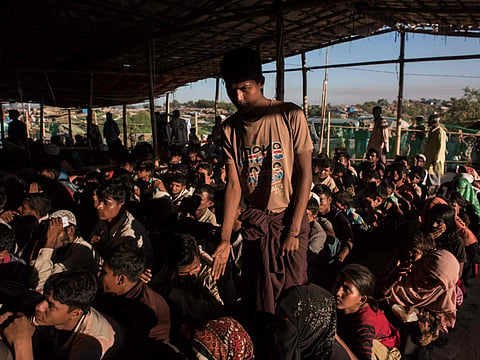The Rohingya issue continues to simmer
If Myanmar continues to deal with the crisis as a security concern, it is likely to exacerbate problems within the country and also beyond its borders

After weeks of negotiations, Bangladesh and Myanmar signed an agreement on November 23 in Naypyidaw that provides for repatriation of Rohingya refugees lodged in Bangladesh. Nearly, 620,000 Rohingya, an ethnic Muslim community in Buddhist majority Myanmar, were forced to flee their homes in Rakhine state in Myanmar, following the military crackdown beginning August last year.
A working group would be set up within three weeks to determine repatriation arrangements. There is no disclosure on how many refugees will be allowed back and how long the process will take. A statement issued from the office of Aung San Suu Kyi, the Myanmar leader, without using the term ‘Rohingya’ said the agreement follows the formula set in the 1992 repatriation agreement signed after an earlier round of violence. Rohingyas, under that agreement, are required to present residency documents, which only a few possess, before they are allowed return. This would mean that very few, if any, would be cleared and that will become the first roadblock in the implementation of the agreement.
The Bangladesh Foreign Minister, Abul Hassan Mahmoud Ali, announced that those who opt to be voluntarily repatriated will be moved to makeshift camps in Myanmar with help from the United Nations High Commissioner for Refugees (UNHCR). The UN and the international community have already expressed their scepticism over an arrangement that will result in ghetto-like living conditions for the returnees.
For Bangladesh, desperate to get the refugees out, it is no surprise that they signed an agreement that only allows the Rohingya transfer from one camp to an indefinite confinement in the other. There can be no safe or dignified return of these refugees while a system of apartheid remains in Myanmar. It is simply unthinkable that people who have been subjected to such brutalities would want to return under conditions where they are likely to face another round of ethnic cleansing, which they may not survive.
Estimated to be more than a million, the Rohingya were stripped of Myanmar citizenship under a 1982 law. Myanmar considers them illegal migrants from neighbouring Bangladesh, who have trickled into Myanmar since the British colonial times. Their movements are severely restricted and are denied access to basic civic services by the Myanmar government. These stateless people have, therefore, been subjected to discrimination and communal violence in the Buddhist majority Myanmar.
An independent Commission headed by former UN secretary-general Kofi Anan warned in August that Myanmar risked fuelling ‘extremism’ if it did not lift restrictions on freedom of movements and rights of Rohingya minority. The current exodus of nearly 600,000 Rohingya began late August when the Myanmar military responded to an attack on three border posts, killing nine servicemen, by armed Rohingyas calling themselves Arakan Rohingya Salvation Army. In a scorched-earth policy, the military reportedly burnt more than 10,000 shack homes, small shops or businesses run by these people, compelling them to flee. The campaign is aimed at instilling fear in the minds of those who the government does not want to come back into the country. Stories of rape and killing children are common. Nearly half of the Rohingya population has now fled Myanmar for makeshift camps in sub-human living conditions in Bangladesh. For UN High Commissioner for Human Rights Zeid Ra’ad Al Hussain, it is a “textbook example of ethnic cleansing”.
The scale and volume of the recent action against the Rohingya has drawn condemnation from the international community that has particularly targeted Suu Kyi, the Nobel laureate and de-facto Myanmarese leader for not doing enough to support the Rohingya people.
Despite the hardship and squalid living conditions in the makeshift refugee camps in Bangladesh, most Rohingya are unlikely to return even if they are promised full citizenship. Living through bouts of discrimination, evacuations and what Washington now admitted is ‘ethnic cleansing’ by Myanmar authorities, no one can blame the Rohingyas for their reluctance to choose staying back where at least their lives are not in danger.
But an indefinite refugee status in makeshift camps also makes them vulnerable to human trafficking. These people, in desperate need of survival, are exposed to petty crime syndicates, which can adversely affect the internal security dynamics of Bangladesh. Some militant organisations are already calling for recruits for terror against what is termed as ‘Buddhist terrorism’ against the Rohingya.
Given the risks, “the path to stability lies in dealing head-on with the fears, claims and desires of all groups in the [Rakhine] state”, says the Brussels based International Crises Group.
Bangladesh, born out displacement of its population during the 1971 civil war, faces a dilemma of its own. While there could be much sympathy for the Rohingyas — the ethnic Bengali cousins of Bangladesh nationals — its limited resources and the possibility of insurgency growing out of Rohingya camps can put it at odds with neighbouring Myanmar — a conflict that Bangladesh can live without. India, as a regional big player, can help but a solution should ideally come from Myanmar.
The current volatile dynamics of conflict pose a major risk to Myanmar’s transition to democracy, which is still in its infancy after decades of military rule. If the Myanmar authorities continue to deal with the issue as a security concern, rather than a political and humanitarian one, it is likely to exacerbate problems not only within the country, but also beyond its borders.
Sajjad Ashraf is an adjunct professor at the Lee Kuan Yew School of Public Policy, National University of Singapore. He was a member of Pakistan Foreign Service from 1973 to 2008 and served as Pakistan’s consul general in Dubai during the mid 1990s.



